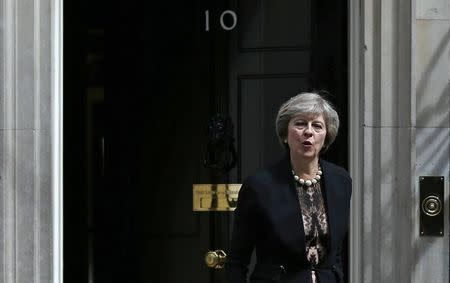Britain's next PM May stakes claim to centre ground

By Kylie MacLellan BIRMINGHAM, England (Reuters) - Britain's next prime minister, Theresa May, pledged on Monday to put government at the service of "ordinary working people", laying claim to the centre ground in an effort to heal rifts exposed by a referendum vote to leave the European Union. May, 59, who could be appointed prime minister within hours after her rival Andrea Leadsom quit the Conservative party leadership race, moved quickly to ease concerns that she would not deliver on Brexit after she campaigned to stay in the EU. After six years in charge of the police and internal security services, May also sought to soften her image by saying she would try to tackle the fears revealed by the referendum campaign and try to give people "more opportunity". "The only surprise is that there is so much surprise in Westminster about the public's appetite for change. And make no mistake, the referendum was a vote to leave the European Union, but it was also a vote for serious change," she told supporters and journalists as she launched her campaign. "I am not going to ignore the public when they say they are sick of politics as usual." She delivered the speech promising to narrow the pay gap between bosses and workers and produce a fairer economy just hours before Leadsom announced she was quitting the race because of what she described as a lack of sufficient support. The chairman of a party committee running the leadership contest said she should soon be confirmed as prime minister-designate. May sounded keen to press ahead with outgoing Prime Minister David Cameron's reform agenda and bring the right-learning party closer to the middle ground - espousing policies associated with the opposition Labour Party, which has moved further to the left. Underlining how the referendum vote has upended the political landscape, veteran socialist Jeremy Corbyn is facing a leadership challenge from a more pragmatic leftist Angela Eagle just 10 months after he was apppointed. NARROW THE PAY GAP May said that as prime minister she would overhaul corporate governance, crack down on tax evasion and avoidance, and boost productivity. "Under my leadership, the Conservative Party will put itself completely, absolutely, unequivocally, at the service of ordinary, working people ... we will make Britain a country that works for everyone," she said. May chose to give her first, and as it turned out her only big campign speech in Birmingham, England's second city in the industrial Midlands region, where many traditionally Labour working class electors voted for Brexit. "We need to reform the economy to allow more people to share in the country's prosperity. We need to put people back in control of their lives. We need to give more people more opportunity," she said, paraphrasing one of the leading messages by the Vote Leave campaign -- to take back control. May, who has portrayed herself as the candidate who can unite both the party and the country, alo said Britain needed proven leadership to steer it through the economic and political uncertainty to come. Her rival, 53-year-old Leadsom, a junior minister little-known in the country, had never served in the cabinet but won admiration in the party for campaigning to leave the EU. Setting out her plans for business, May also said she would enforce annual binding votes on both pay policy and specific pay packages of company directors. Investors in every UK company have a non-binding vote yearly on the firm's remuneration report, which details the pay and perks given to executive directors in the year under review. Shareholders are also guaranteed separate, binding votes at least once every three years on a firm's remuneration policy, which governs future payouts. Chief executives at British companies have come under increasing pressure from shareholders over salary and bonus payments that have risen much more sharply than their workers' remuneration. "We're the Conservative Party, and yes we're the party of enterprise, but that does not mean we should be prepared to accept that 'anything goes'," May said. (Writing by Elizabeth Piper; Editing by Paul Taylor)

